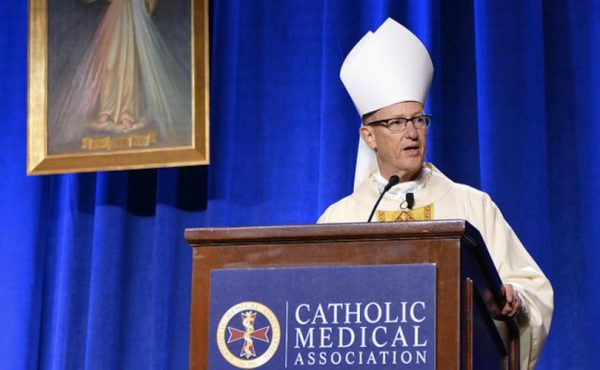By Bishop James Conley
Jack Phillips is a Christian. In 2016, he told a reporter that “nothing matters more” than his relationship with God.
Jack is also a baker. In 1993, he and his wife opened a cakeshop in Lakewood, Colo., a suburb of Denver, not far from the parish where I lived as Auxiliary Bishop of Denver. Jack makes custom cakes for birthdays, baptisms, weddings, and other celebrations. He is dedicated to his craft and puts himself into those cakes. He sees them as more than products; he sees them as art.
In 2012, customers of Jack’s asked him to bake a cake for their same-sex wedding. Jack believes that God intended marriage to be the union of a man and woman. He doesn’t believe he can create a piece of artwork to celebrate something that contradicts his deeply held beliefs. And so, he told his customers he could not in good conscience create a wedding cake for them. Out of respect for his customers, Jack suggested some possible alternatives. It wasn’t an easy decision to make, but the Phillips family prayed about it, and acted as they believed their faith called them.
That decision had profound consequences. A complaint was filed with the Colorado Civil Rights Commission. Phillips was found to have violated his customers’ civil rights. The bakery was ordered to change its policy, to provide staff training, to file compliance reports with the state, and to provide cakes for same-sex weddings.
The Phillips family redoubled their prayers and stayed strong. They appealed that decision. Their appeal made it all the way to the Supreme Court. And this week, the Supreme Court decided that their civil rights had been violated and that their right to religious liberty had been infringed upon.
Legal scholars have already begun debating the consequences of the Supreme Court decision, asking what effect, if any, this decision will have on the broad questions about religious liberty that our country faces.
Those questions should be considered carefully. But as a pastor, I am struck by another aspect of this case: that the Phillips family knows what it means to live faithfully as disciples of Jesus Christ, even when doing so causes hardship and suffering.
All of us have a tendency to compartmentalize our lives; to separate our professional lives from our personal and family lives, to think of friends differently than colleagues. Some boundaries in our lives are good, and appropriate. But our relationship with Jesus Christ must transcend all other boundaries. To be followers of Christ means to follow him at every juncture of every life; to make him the lord of our hearts, the lord of our homes, the lord of our finances, and the lord of our work. To seek first the kingdom of God.
Faith in Jesus Christ will bear little fruit, in this world or the next, if we only express it within the walls of our churches.
In 2012, Jack Phillips knew that his work had to be faithful to the Gospel. He knew he couldn’t separate his life as a Christian from his life as a businessman, an artist, and a baker.
Nor can any of us.
Of course, this does not mean that a bank teller must ask every customer in line whether they follow Jesus. It does not mean that a waiter must offer his testimony of faith before reciting the specials of the day. It does not mean that a baker must decorate every cake with quotes from Scripture, or icing figurines representing the Last Supper.
But it does mean that we must remember that our social, business, and family lives have moral dimensions. And that we do need to give authentic witness to our lives as disciples of Jesus Christ, in ways that are evident to those around us. Making Christ the Lord of our work means making choices in our professional lives that honor the dignity of the human person, and the sovereignty of God.
Jack Phillips made such a choice in 2012. He paid a heavy price for it. But he was faithful to the Gospel. And because of that, he gave witness to the Jesus Christ, who has paid a heavy price for our salvation, and who calls us to make him the lord of our lives.
………………………………………..
Episcopal Advisor CMA-USA
Most Rev. James D. Conley, DD
Diocese of Lincoln, NE
Since his priestly ordination in 1985, Bishop James D. Conley has served the Catholic Church in a wide variety of ways—as pastor, college campus chaplain, director of Respect Life ministries, theology instructor, Vatican official and bishop. In all of these tasks, he has seen his life as a priest as a call to service and complete surrender to “God’s providential hand.”
For his episcopal motto, Bishop Conley, a convert to the Catholic faith, chose the same motto as the great 19th-century English convert, John Henry Cardinal Newman, “cor ad cor loquitur,” which means “heart speaks to heart.” Bishop Conley became the Episcopal Advisor to the CMA in January 2014.








